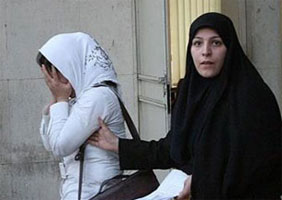Tehran: behind the missiles to Israel, the ayatollahs' 'war' on women
Coinciding with the 13 April attack, the police chief launched a 'campaign' against 'violations of the hijab law'. From prison, Nobel Peace Laureate Mohammadi speaks of a 'generalised assault' of rape, abuse, torture. The authorities 'mute' the phones of those protesting. Strikes in universities, feminicides also on the rise.
Tehran (AsiaNews) - The spotlight of the international community was on the drone and missile attacks launched by Tehran towards Israel, which raised fears of an escalation of the conflict in the Middle East towards an open war between the Islamic Republic and the Jewish State, a risk that is still present.
However, in the same days and in general silence, a vast repression of dissent was launched within Iran's borders, with one primary target: women and their battle that has been going on for more than a year and a half against the hijab and the rigid norms of morals imposed by the ayatollahs in the aftermath of the killing of Mahsa Amini at the hands of the morality police, which have been tightened in the last period. To silence them, as IranWire reports, the authorities 'mute' smartphones and mobile devices of those who 'dare' to denounce the headscarf law.
In the front row against the campaign of repression - from her cell in Evin prison - Nobel Peace Laureate Narges Mohammadi, who speaks of a "generalised assault against women" made up of arrests, sexual violence and human rights violations.
In her message, she reports the story of Dina Qalibaf "who had just arrived in the women's section of the prison with visible bruises and a harrowing history of abuse" perpetrated on the officers. The ongoing attacks, he explains, 'are not a demonstration of power, but a desperate act of a tyrannical regime' in a context of 'all-out war on the streets' against the female gender.
Words that find confirmation in the excited chronicles of 13 April, the day of the ayatollahs' attack on the Jewish state: in the same hours, in fact, Tehran's police chief Abbasali Mohammadian appeared on national TV to announce the campaign.
'Starting today,' he said, 'the police in the capital and other cities will implement measures against those who violate the hijab law'. Meanwhile, hundreds of officers - including plainclothes security forces - patrolled the streets, with videos posted on social media of arrests of women 'improperly dressed' and dragged onto police vans.
The campaign even drew criticism from within the ruling class, with some reformist politicians voicing their criticism online, fearing the risk of a further rift between the establishment and civil society. "Just at a time when solidarity is more crucial than ever, the same ugly scenes are escalating with more violence against Iranian women and girls! What politics is this?" writes reformist Azar Mansouri on X, formerly Twitter. Former minister Ali Rabeie adds: 'At a time when Iranians feel proud to confront Israel, suddenly a group (of decision-makers) pushes society towards confrontation with the establishment'. Others suspect that there is a political reason behind the crackdown, with the aim of instilling fear to prevent possible protests or dissent against the risk of open war with Israel.
The ferocity of the ayatollahs in terms of rape, torture and sexual abuse also emerges from a report published in recent days by Human Rights Watch (Hrw), focusing on the repression carried out between 2022 and 2023 of pro-Mahsa Amini demonstrations, with women in the front row.
The NGO investigated the abuse suffered by at least 10 female prisoners between September and November 2022, belonging to the Kurdish, Azerbaijani and Beluchi minorities, seasoned with rape by security forces and prison staff.
And more torture to extract confessions of crimes that were never committed, tantamount to a "weapon of injustice" as the Iranian head of Hrw Nahid Naghshbandi defines it, which mainly affect "ethnic minorities". A Kurdish woman recounted the sexual assault she suffered in November 2022 by two intelligence men while a female officer detained her.
Systematic attacks on women affect every aspect of public and private life, from the classroom to the home: in recent days, more than 200 female students from Tehran's Amir Kabir University went on strike, refusing to attend classes to protest against recent repressive actions by security agents for alleged dress code violations. At the forefront were the students and students enrolled in the faculties of engineering and mathematics, but many classes were interrupted, from medicine to chemistry, for a protest that threatens to spread to other universities in the capital.
Finally, feminicides, the latest case last week in Tehran where the husband killed his wife at the end of a family quarrel, then reported her missing in an attempt to divert the investigation. This case is far from isolated: pro-human rights groups report at least 50 murders in the last 100 days, 20% of which are attributed to 'honour killings'. The Shargh newspaper, in a report based on official statistics for 2023, counts at least 165 feminicides at the hands of a male relative in the family, 41 of which occurred in the capital.







.png)










